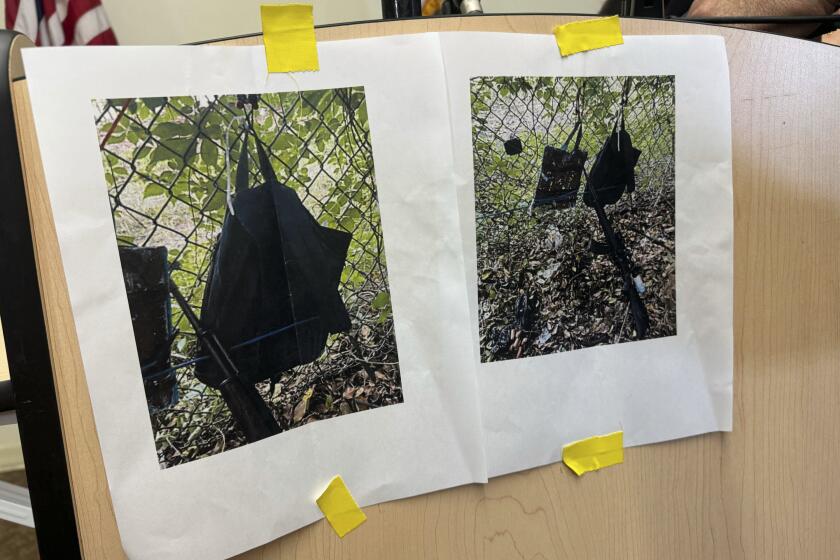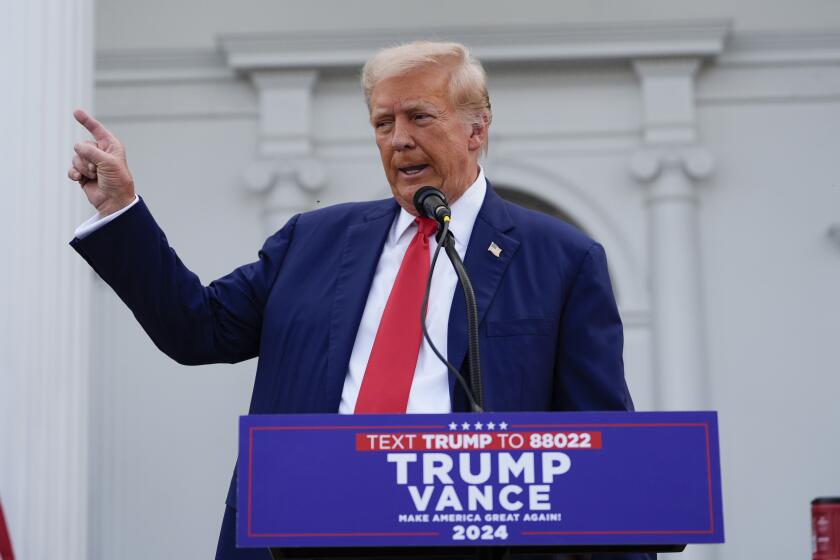Marco A. Firebaugh, 39; Ex-Assemblyman Was an Advocate for Those of Few Means
Marco Antonio Firebaugh, a former California Assembly majority floor leader and chairman of the California Latino Legislative Caucus who was a strong advocate for immigrants and working families, died Tuesday. He was 39.
Firebaugh, a Democrat from Whittier, died at UCLA Medical Center. Doctors attributed Firebaugh’s death to influenza and liver failure, Firebaugh spokesman Ricardo Lara said.
He had been diagnosed with a liver condition in 2003.
At the time of his death, Firebaugh was a candidate for the state Senate in the 30th District, in southeast Los Angeles County.
He had served in the Assembly from 1998 to 2004, representing the 50th District.
From 2002 to 2004, Firebaugh served as chairman of the California Latino Legislative Caucus.
During the same period, he was majority floor leader, which made him the highest-ranking Latino in the Assembly and one of the chief negotiators for Assembly Democrats.
“This is a moment of profound sadness and grief for all of us who liked and respected Marco Firebaugh,” Assembly Speaker Fabian Nunez (D-Los Angeles) said in a statement.
Describing Firebaugh as “an effective chairman of the Latino caucus as there ever was,” Nunez said Firebaugh “fought to expand access to a college education for all Californians, and he authored landmark air-quality legislation targeting the health of the low-income communities that he served.”
Senate Majority Leader Gloria Romero (D-Los Angeles) recalled in a statement that Firebaugh “never backed down from a tough fight for what was right. He stood up for immigrants and working families, and courageously took the lead on social justice issues when many others remained silent.”
Assembly Majority Leader Dario Frommer (D-Glendale), who served with Firebaugh in the Legislature and previously practiced law with him, called Firebaugh “a tireless advocate for millions of Californians who have no voice in government.”
The Tijuana-born son of Mexican immigrants and one of five children, Firebaugh took his stepfather’s name after his mother divorced and remarried.
He earned a bachelor’s degree in political science from UC Berkeley in 1993 and a law degree from UCLA in 1997.
A protege of former state Sen. Richard Polanco (D-Los Angeles), Firebaugh credited Polanco with helping him generate thousands of dollars in contributions and an endorsement for his 1998 run for the Assembly.
“Marco first came to my attention as an intern when he was at Berkeley,” Polanco recalled Tuesday. “I saw a real spunk, a lot of determination, and just a lot of passion for wanting to make government work for people.”
After Firebaugh’s internship, Polanco hired him as a committee consultant.
When Firebaugh decided to run for the Assembly, Polanco said, “I knew this very talented, very smart, very giving individual would really do well in representing the working people in that district.”
Six weeks before the Democratic primary in 1998, Firebaugh was arrested by the California Highway Patrol on suspicion of drunk driving.
The arrest was not reported by the media at the time and Firebaugh, who pleaded not guilty, did not go to trial until 13 days after he had become the district’s Democratic nominee.
Firebaugh took the stand in his own defense during his weeklong jury trial, arguing that he had not been drunk and that the breath test was flawed.
He was convicted and sentenced to 36 months’ probation, ordered to pay $1,241 in fines and restitution and perform 20 hours of community service.
In a 1998 interview with The Times, Firebaugh called the arrest “a serious mistake” and “an aberration in terms of my life.”
“I didn’t share this incident widely with people because it doesn’t define who I am or what I can accomplish,” he said.
Firebaugh, according to a 2004 Sacramento Bee story, did not know he had a liver ailment until he walked into the office of his children’s doctor in the summer of 2003.
The doctor took one look at Firebaugh, who had lost considerable weight and whose skin was unnaturally dark, and immediately diagnosed the problem.
“I drank like a fish, ate like a pig, stayed out till wee hours of the night and never slept,” Firebaugh told the newspaper. He said his liver was “traumatized” by all the toxins in his body.
Doctors, according to the Sacramento Bee account, were afraid that he might slip into a coma.
They revoked his driving privileges and prescribed medication and treatment that prevented him from returning to the Capitol until January 2004.
During an interview that March, Firebaugh said the ailment was reversible and felt he was “80%” recovered. He had, he said, stopped drinking and no longer worked seven days a week.
“You know what I figured out?” he said. “As much as I thought I was absolutely essential to the operation of this joint, when I was gone, it went on.”
Last year, a new high school named in Firebaugh’s honor opened in Lynwood.
Firebaugh, who was president of MAF Strategic Consulting Inc., a Los Angeles public relations firm, served as a visiting professor and policy fellow at the UCLA School of Medicine, Center for the Study of Latino Health and Culture. He also was a commissioner on the California Medical Assistance Commission.
Firebaugh, who was divorced, is survived by his mother, Carmen Ramos Garcia; his children, Tlalli Ariana and Nicolas Andres; his brothers, Carlos and Jesse; and his sisters, Cecilia and Esmeralda.
Funeral services are pending.
More to Read
Get the L.A. Times Politics newsletter
Deeply reported insights into legislation, politics and policy from Sacramento, Washington and beyond. In your inbox three times per week.
You may occasionally receive promotional content from the Los Angeles Times.










